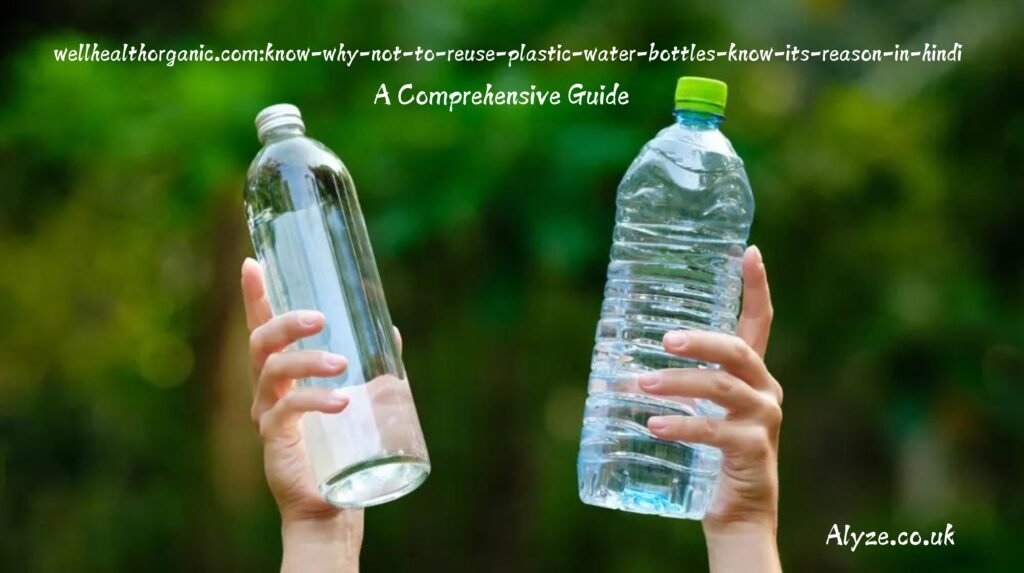Introduction
wellhealthorganic.com:know-why-not-to-reuse-plastic-water-bottles-know-its-reason-in-hindi : The concept of reusing is good when we are having a mindset of protecting the environment. However, for plastic water bottles, this may do more harm than good. Here’s why you should never refill your plastic water bottles—backed by research, global perspectives, and the real science lying behind the potential risks.
Also Read : 시그널 vs 와쌉 메신저 : Comparison of Privacy, Features, and Global Impact
Understanding Dangers of Reusing Plastic Water Bottles : wellhealthorganic.com:know-why-not-to-reuse-plastic-water-bottles-know-its-reason-in-hindi
Plastic water bottles are easy to get , inexpensive, and are found everywhere and has became a part of our day to day life. But they’re not designed to be reused, and that raises a number of possible hazards.
- a. Leaching of Toxic Chemicals: Single- Use Plastic Bottles Plastic bottles are specifically exclusively for single use, especially for PET (polyethylene terephthalate). With time, through repeated washing, or on exposure to heat, they will end up leaching harmful chemicals, especially BPA and antimony. Known to cause imbalance in the hormonal system in the human body. BPA is particularly identified as an endocrine instability and is also among the reasons behind health problems, including hormonal imbalance, reproductive problems, and cancer in some cases.
- b. Microbial Contamination Each time you re-usage a plastic bottle, especially without adequate cleaning, you are actually creating an environment for bacteria to foster. A warm, wet bottle is the ideal setup for growing dangerous bacteria such as E. coli and Salmonella. These bacteria grow to cause infections, gastrointestinal diseases, and other health-related problems if a bottle is not cleaned and dried properly after use.
- c. Degradation of Plastic Integrity After several uses and exposure to environmental elements, especially the effect of direct sun rays and heat, the plastic wears out. With this, there is a developing liability for cracks and wear, increasing the risk of chemical leaching and providing minute crevices where bacteria can hide, thus rendering the bottle very hard to clean comprehensively.
The Environmental Impact of Reusing Plastic Water Bottles : wellhealthorganic.com:know-why-not-to-reuse-plastic-water-bottles-know-its-reason-in-hindi
While using plastic bottles more than once seems very environment-friendly, it is not free from its problems and implications.
- False Sense of Responsibility to the Environment Reusing plastic bottles may give one a feeling that they are saving some amount of waste, but in reality, one is actually continuing a cycle that promotes continued production of plastics. The more people reuse plastics for single-use items, the more producers tend to produce them, thus creating a cycle of plastic consumption and resulting wastes.
- Increased Waste and Recycling Problems Due to their nature, most of the plastic bottles used over and again get disposed of after a period as they get too worn out or develop some cracks. Normally, such bottles are not recycled, but instead, they add up to plastic waste either in landfills or oceans. If they are recycled, this process tends to be inefficient and energy-intensive, and not all plastic bottles can be recycling in every region thus furthering the environmental problems.
- Energy Consumption in Production Plastic bottle production consumes a lot of energy and natural resources. By reusing a plastic bottle, you are simply continuing to use a product beyond its intended lifetime, which indirectly increases demand for more energy and resources to replace these bottles as they wear out.
Plastic Bottle Reuse: Global Perspective
Another major issue, discussed around the world, relates to the different challenges and regulations in place regarding plastic bottles in use and their reuse.
- Europe’s Stance on Single-Use Plastics : The European Union does far better in an effort to reduce the use of single-use plastics, including water bottles. It leads the charge in reducing plastic consumption for a better ecological impact with policies encouraging the reprocessing and minimizing plastic wastes. The focus is, however, on reducing use rather than promoting re-use of plastic bottles.
- Plastic Bottle Re-use : In Developing Nations In most developing nations, plastic bottles are used several times owing to the economic factor. This is often coupled with ignorance of the health risks associated with the act. It is therefore important to create awareness on these dangers in such regions so as to avoid health problems resulting from reusing plastic bottles.
- Consumer Practices in North America: While there is growing awareness regarding the environmental and health risks arising from plastic bottle reuse, there is a very slow pace of change in consumer habits in North America. This can be changed only through campaigns and education on such themes for more sustainable alternatives to reusable water bottles made of stainless steel or glass.
Better Choices than Re-Using Plastic Water Bottles
When we closely study about the risk involved, it is much safer and more sustainable to choose alternatives from these plastics water bottles:
- Stainless Steel Water Bottles: These are strong, reusable, and contain no health risks like that of plastic bottles. They are easy to clean and have no harmful chemicals that gets mix into drinks. This makes them much safer for one’s daily hydration.
- Glass Water Bottles: Another fabulous option, although more brittle, is glass bottles. They do not retain odors or even tastes and are void of chemicals such as BPA. In addition, glass is one hundred percent recyclable and, therefore, another more sustainable material.
- Reusable Bottles: Some bottles come with built-in filters which can be re-used. With them, one is guaranteed clean drinking water that no place can deny you. Ideal for the busy person who might not have access to filtered water all the .
FAQs on wellhealthorganic.com:know-why-not-to-reuse-plastic-water-bottles-know-its-reason-in-hindi
Q. Can washing a plastic water bottle really make it safe to refill and use again?
Washing can remove some of the bacteria, but all efforts will be in vain due to the leaching of chemicals into your drink from its repeated use.
Q: All plastic bottles are unsafe for re-use?
Not all, but most single-use plastic bottles, especially the single used bottles so it is better to use alternative
Q3: How many times can I safely reuse a plastic water bottle?
Ideally, plastic bottles should not be reused. If you have to reuse them, then preferably not more than a couple of times, at the very least.
Conclusion: wellhealthorganic.com:know-why-not-to-reuse-plastic-water-bottles-know-its-reason-in-hindi
wellhealthorganic.com:know-why-not-to-reuse-plastic-water-bottles-know-its-reason-in-hindi Reusing plastic water bottles might seem cost-effective and eco-friendly, but health risks and environmental impact stand way heavier against any of the apparent benefits. Choosing safer alternatives which are reusable gives health protection and a healthier planet.
Knowing the risks associated with reusing plastic water bottles facilitates making a decision in regard to health and safety for people and the environment. Now you can make a difference: decide wisely, and you will be having a much healthier tomorrow for yourself and your planet. See More…



